Talk to a Registered Dietitian and use INSIDER20 for 20% off!
Talk to a real Dietitian for only $99: Schedule Now
This post contains links through which we may earn a small commission should you make a purchase from a brand. This in no way affects our ability to objectively critique the products and brands we review.
Evidence Based Research To fulfill our commitment to bringing our audience accurate and insightful content, our expert writers and medical reviewers rely on carefully curated research.
Read Our Editorial Policy
If you’ve ever stayed up late watching television or flipped through a celebrity gossip magazine, you’ve likely seen ads for fat-burning pills or “quick ways to lose 20 pounds of fat in two days!”
But even though there are thousands of weight loss supplements and diet pills on the market, many of them are not trustworthy or effective—in fact, many can actually be harmful.
However, research has supported the use of some compounds, like green tea extract and moderate doses of caffeine, to support healthy weight loss.
Although you can’t target belly fat alone, it’s possible that certain supplements could support overall body fat loss.
Let’s take a closer look at the research behind supposed “belly fat-burning compounds,” including which supplements may help aid weight loss and which ones to avoid.
With the preceding research in mind, most of the “fat burner” supplements on the market are likely ineffective—and may even cause adverse effects.
However, some supplements may support weight loss or body fat reduction—although keep in mind that no supplement can specifically target belly fat loss.
In addition to its cheeky name, the HUM Ripped Rooster supplement contains green tea extract with EGCG and 7-keto DHEA.
The compound 7-keto DHEA is a non-hormonal metabolite of the hormone DHEA that may increase metabolic rate.
In a randomized controlled trial from 2007, overweight adults who supplemented with either 7-keto DHEA or a combination supplement (containing 7-keto DHEA, calcium citrate, green tea extract, vitamin C, chromium nicotinate, and vitamin D) had increased resting metabolic rate compared to placebos.
This supplement also includes chromium polynicotinate (a mixture of the trace mineral chromium with a form of the B vitamin niacin), which helps to regulate blood sugar and possibly increase lean body mass.
Overall, Hum Ripped Rooster has good evidence for weight loss with few potential side effects.
The Hi-Health Metabolic Fusion supplement contains many various compounds—some that have evidence for weight loss benefits, and some that don’t.
This supplement includes:
As you can see, they added in just about every potential fat-burner compound.
Due to the abundance of ingredients, it’s possible that this supplement could cause adverse side effects, including digestive issues, headaches, or dizziness.
Due to the health benefits and few reported adverse effects of green tea extract, the NOW EGCG Green Tea Extract is a good option for a weight loss supplement.
In addition to potentially increasing energy expenditure, EGCG is thought to reduce cellular oxidative stress, lower inflammation, and provide anti-cancer activity.
Nature’s Way Forskohlii Standardized contains forskolin root extract, which may support healthy body composition.
Although the research is limited, forskolin may benefit weight loss and appears to be safer for consumption than others, like yohimbine and Garcinia cambogia.
Belly fat burners are typically dietary supplements or “diet pills” that contain natural or synthetic compounds that claim to burn belly fat.
Most often, fat burners claim that they can target fat loss in the stomach or promote toning or sculpting.
However, these supplements—if they do work—don’t actually “burn” fat.
Rather, they might (in theory) speed up metabolic rate to burn more calories, reduce the amount of food (typically either carbohydrates or fat) that your digestive tract absorbs, or suppress appetite.
While certain compounds do have some weight loss benefits, others are simply marketing tactics.
And as the FDA does not regulate dietary supplements, manufacturers can put just about anything into a supplement—as well as claim anything they want on the label—making some ineffective, a waste of money, or even potentially dangerous to consume.
Some ingredients found in fat-burner supplements may cause small amounts of weight loss in research studies, but not all have been clinically tested.
Let’s dive into the research behind seven of the most common compounds in fat-burner supplements.
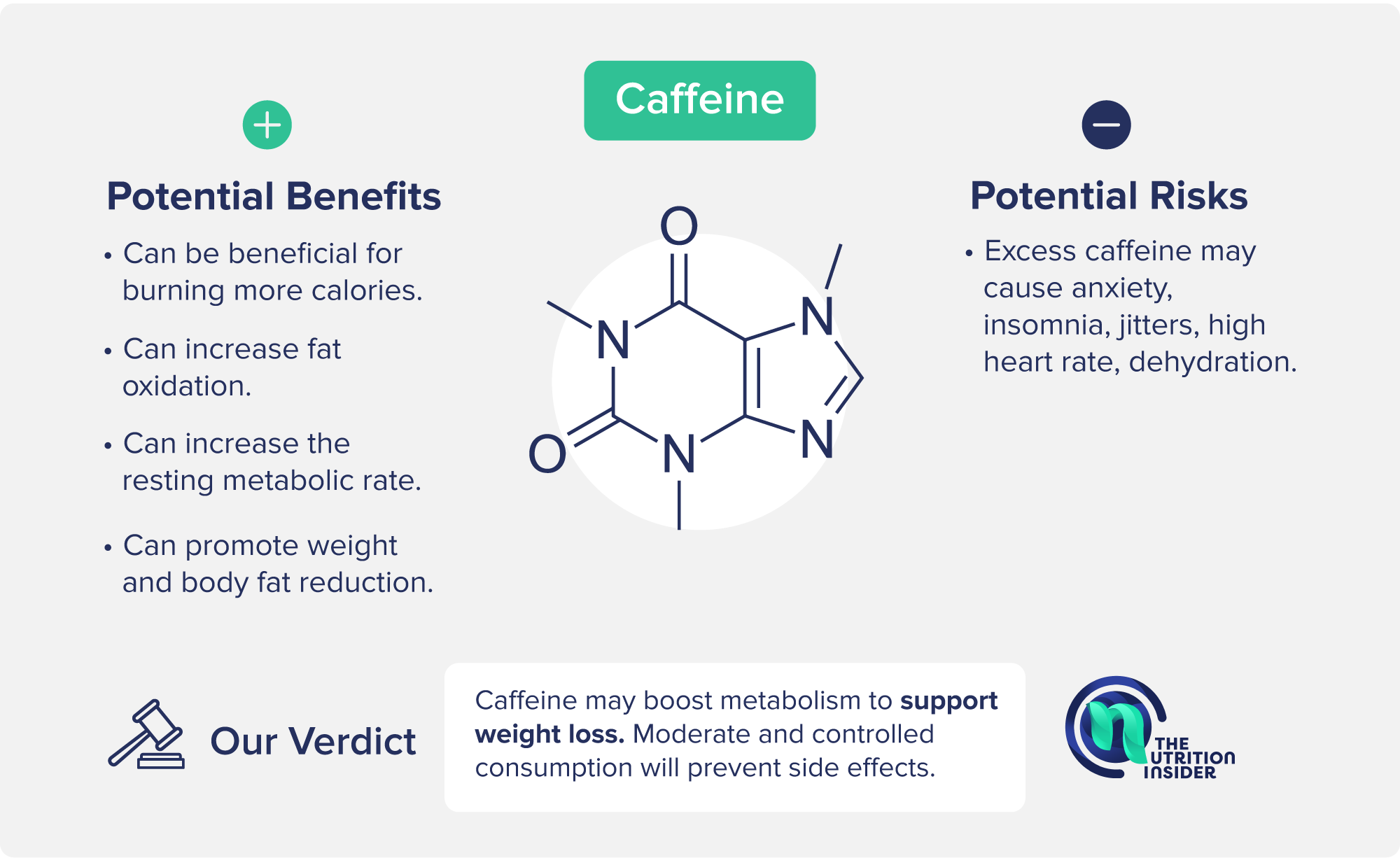
Caffeine is a well-known nervous system stimulant found in coffee, tea, and chocolate.
But fat-burner supplements containing caffeine can have much higher amounts than what is typically found in natural sources, which can be dangerous.
Excess caffeine can cause anxiety, insomnia, jitters, high heart rate, and dehydration.
However, research has shown that caffeine can increase metabolic rate, which could be beneficial for burning more calories.
In an older study from 1995, researchers looked at thermogenesis—essentially burning calories—in obese and lean women after consuming caffeine.
The lean and obese women who consumed caffeine experienced increased thermogenesis at average rates of 7.6% and 4.9%, respectively.
This increase in energy expenditure also led to significant increases in fat oxidation the next day in both groups.
A similar study found that a single dose of 100mg of caffeine increased the resting metabolic rate of both lean and obese people by 3-4% over 150 minutes.
Plus, repeated administration of 100mg of caffeine at 2-hour intervals over 12 hours increased energy expenditure by 8-11% throughout the day, correlating to an additional energy expenditure of 150 calories and 79 calories in lean and obese people, respectively.
In a 2019 meta-analysis of 13 randomized controlled trials, the researchers concluded that caffeine intake promoted weight and body fat reduction.
Because metabolic rate is multifactorial and complex, future research is needed to pinpoint why caffeine affects lean and obese people differently.
Still, overall, the research indicates that moderate caffeine consumption may boost metabolism to support weight loss—but not belly fat specifically.
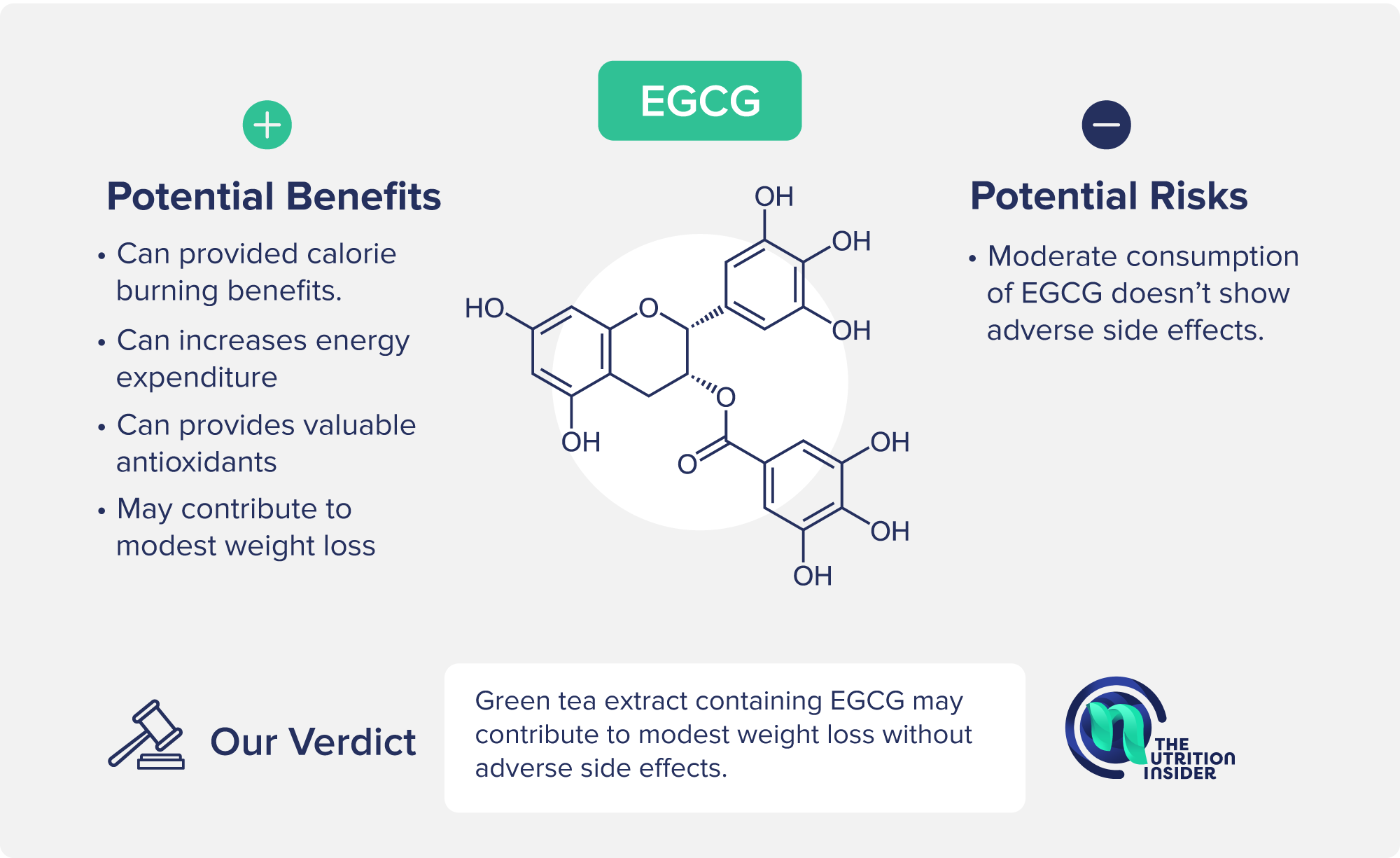
Green tea has been studied for its potential impact on weight loss and fat burning.
Some research looks at drinking green tea itself—which requires consuming three daily cups or more—but supplements typically contain EGCG (epigallocatechin gallate), an antioxidant compound prevalent in green tea.
EGCG and other catechins are likely what produces the potential fat-burning effects.
One study found that men who consumed green tea extract (containing 50 mg caffeine and 90mg EGCG) three times per day had a significant increase in 24-hour energy expenditure compared to those who just consumed just 50mg of caffeine, indicating that the EGCG provided additional calorie burning benefits.
In a 2016 randomized controlled trial, obese women who supplemented with high doses of EGCG (857mg) per day for 12 weeks experienced significant reductions in body weight, BMI, and waist circumference compared to those taking a placebo.
However, the weight loss was only 2.4 pounds over 12 weeks, which is not much.
Plus, a 2008 trial of obese women did not see a significant difference in weight loss when consuming a green tea extract supplement compared to a placebo.
Overall, green tea extract containing EGCG provides valuable antioxidants, increases energy expenditure, and may contribute to modest weight loss without adverse side effects.
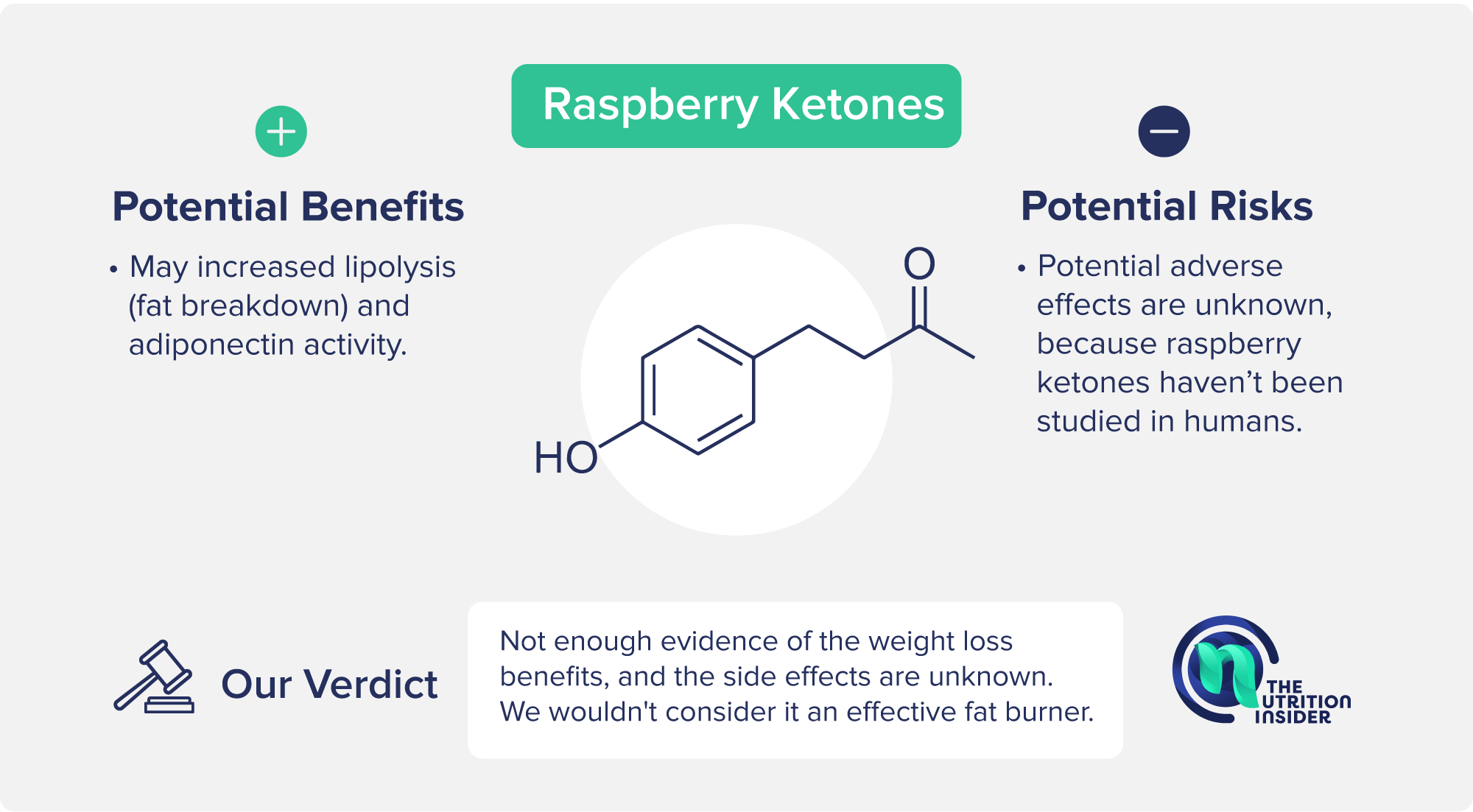
Raspberry ketones are naturally found in raspberries and are used as additives or flavorings in various processed foods.
However, raspberry ketone supplements are synthetically manufactured and are not derived from the fruit.
Despite the word “ketone” in their name, they have no relation to the ketogenic diet or elevated blood levels of ketones.
Raspberry ketone supplements claim to cause the fat within cells to break down more effectively, helping your body burn fat faster.
They also claim to increase adiponectin levels, a metabolism-regulating hormone.
Some research in test tubes and mice has shown positive results with raspberry ketones, but studies with humans still need to be done.
One study with fat cells from mice found that raspberry ketones increased lipolysis (fat breakdown) and increased adiponectin activity.
Although adiponectin levels do increase when people lose weight, exercise can also increase its activity.
Plus, because raspberry ketones haven’t been studied in humans, potential adverse effects are unknown.
Overall, there is little credible evidence that raspberry ketones benefit weight loss or fat burning and the side effects are unknown.
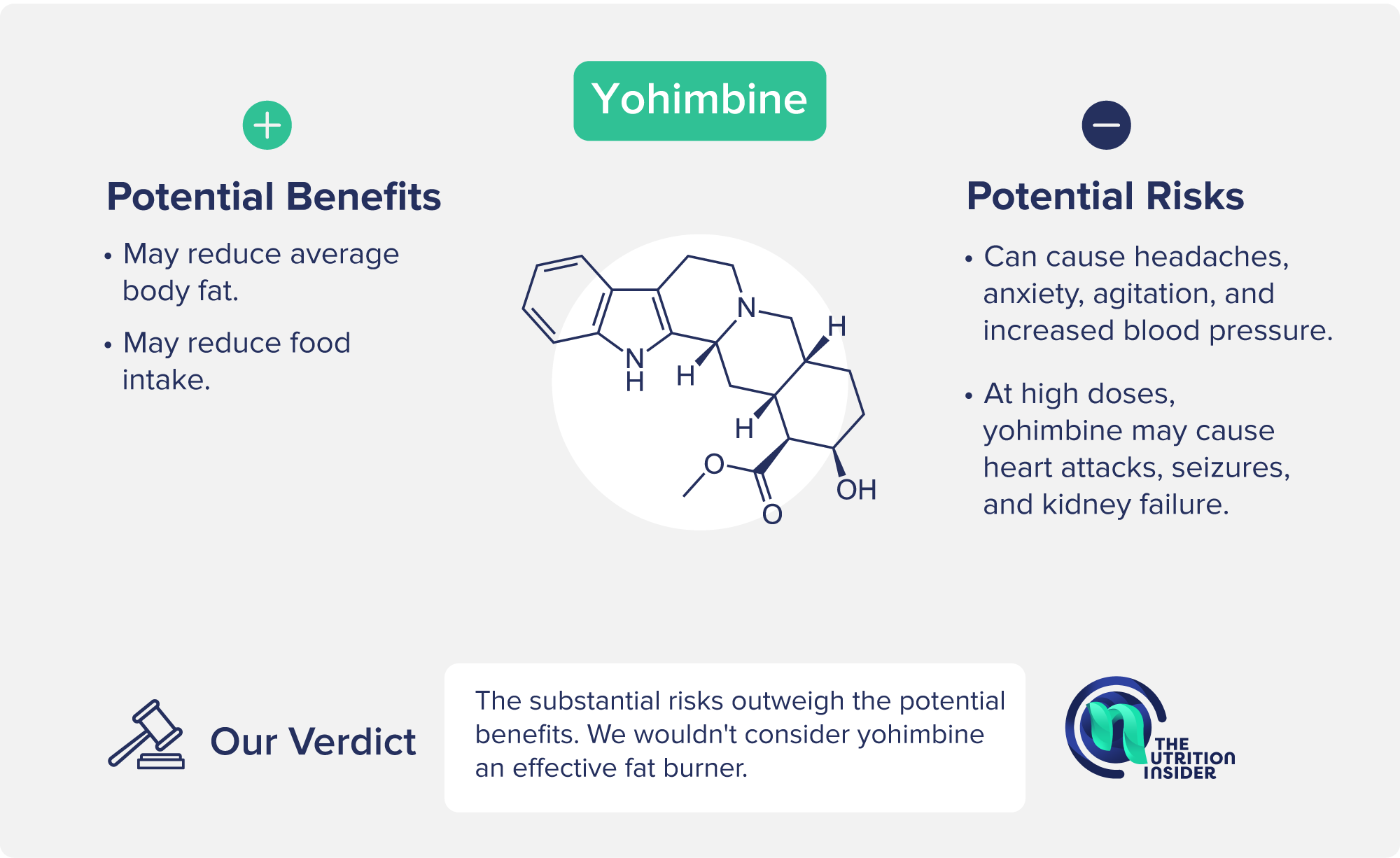
Yohimbine is a plant compound from the bark of the Yohimbe tree, native to central and western Africa.
Although it’s found in many fat-burning supplements, there is not much research on it—and there are many documented side effects.
Yohimbe can cause headaches, anxiety, agitation, and increased blood pressure—and at high doses, it may cause heart attacks, seizures, and kidney failure.
Further, many yohimbine supplements have been found to be inaccurately labeled, containing up to 147% more yohimbine than reported on the label.
It’s thought that yohimbine works as a stimulatory compound by inactivating alpha-2-adrenergic receptors on fat cells to allow more lipolysis.
In a 2006 study, 20mg of daily yohimbine supplements in elite male soccer players reduced average body fat from 9.3% to 7.1% over 21 days.
In an older study, yohimbine reduced food intake by 49-62% in obese rats.
While some research has indicated that yohimbine may help with fat loss, the substantial risks do not outweigh the potential benefits.
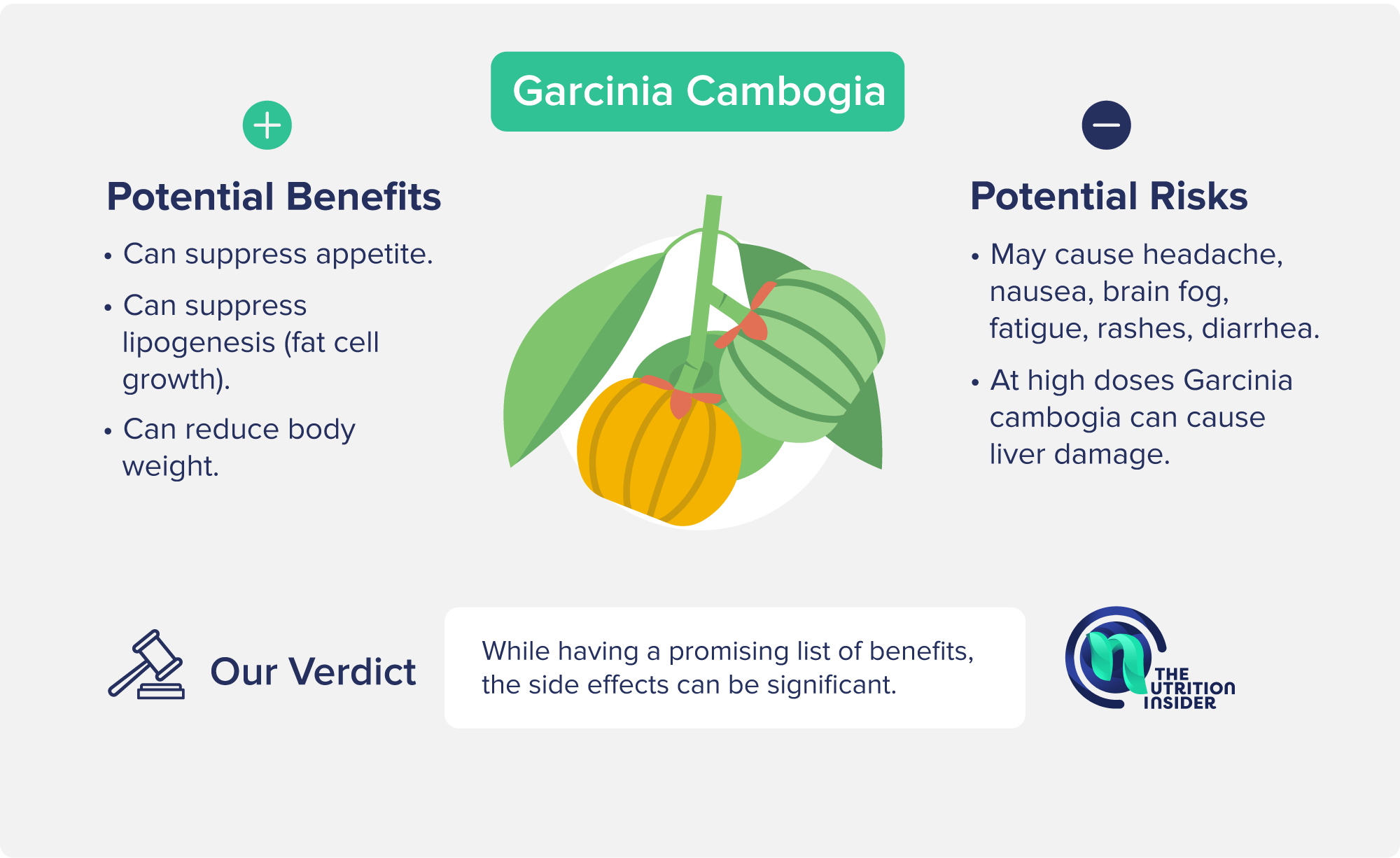
Garcinia cambogia is a plant native to India and Southeast Asia.
The fruit’s rind contains a chemical called hydroxycitric acid (HCA), which has been studied for its effect on appetite suppression.
In animal studies, HCA suppressed de novo lipogenesis (fat cell growth) and reduced body weight.
Several trials have examined the effects of supplemental Garcinia cambogia supplements on body weight and fat, but the results are conflicting.
In a 2020 meta-analysis of eight trials including 530 participants, researchers concluded that Garcinia cambogia significantly reduced body weight by 2.95 pounds and fat mass by 0.42% compared to a placebo.
However, another randomized controlled trial published in the reputable medical journal JAMA found that Garcinia cambogia supplements failed to affect weight loss or body fat.
Side effects of Garcinia cambogia include headache, nausea, brain fog, fatigue, rashes, diarrhea, and other gastrointestinal symptoms—plus, high doses can cause liver damage.
Overall, Garcinia cambogia is a promising contender for modest weight loss, but the side effects can be significant.
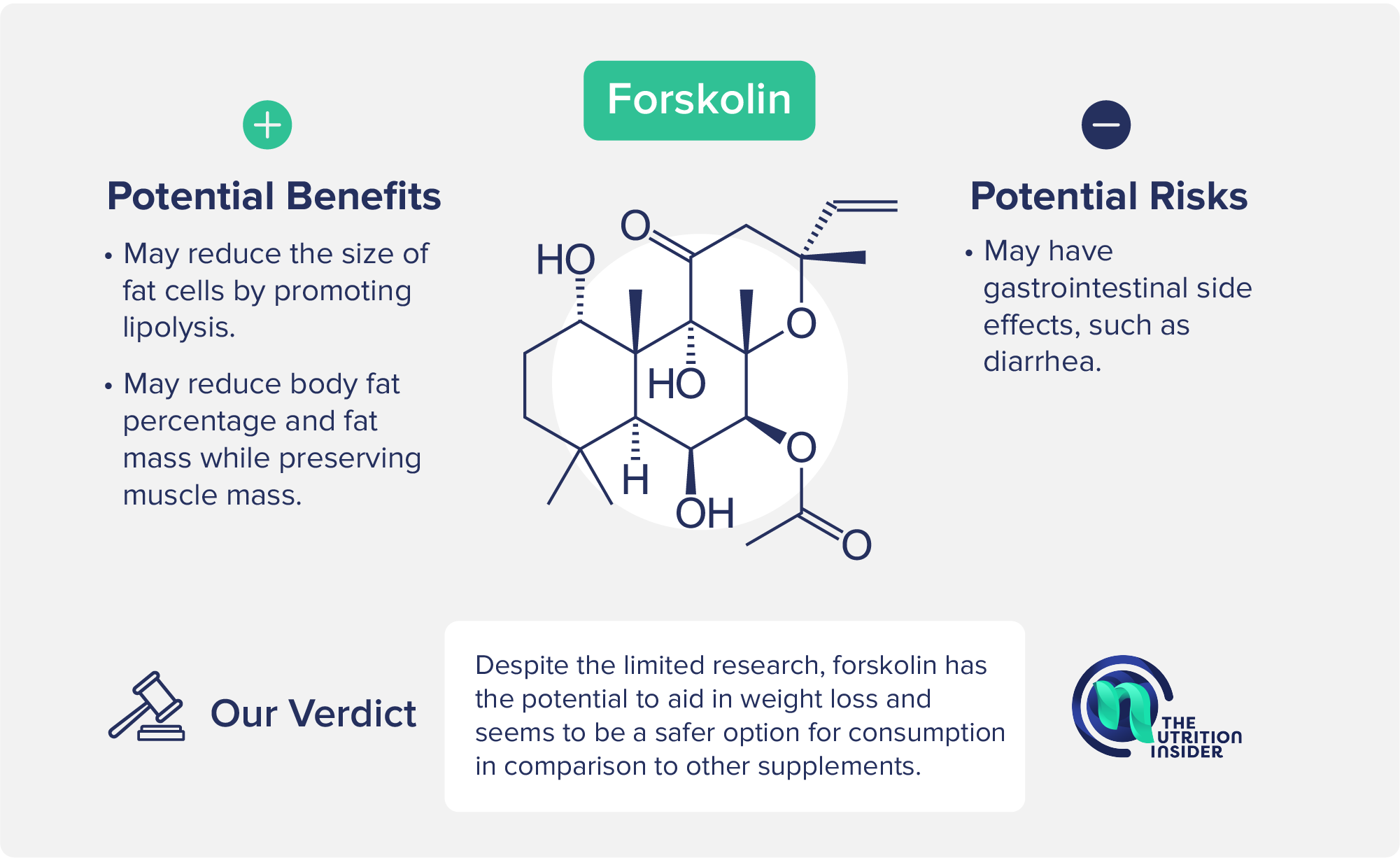
Forskolin is an active compound found in the roots of a tropical plant called Indian coleus (Coleus forskohlii).
Although it has been used in traditional herbal medicine for centuries for various ailments, it’s unclear whether forskolin could promote weight or fat loss.
Forskolin is thought to reduce the size of fat cells by promoting lipolysis.
In a 2005 study with 30 overweight or obese men, those who took forskolin saw modest reductions in body fat percentage and fat mass while preserving muscle mass.
While forskolin is generally well tolerated, some side effects may include gastrointestinal side effects, such as diarrhea.
Although the research is limited, forskolin may benefit weight loss and appears to be safer for consumption than others, like yohimbine and Garcinia cambogia.
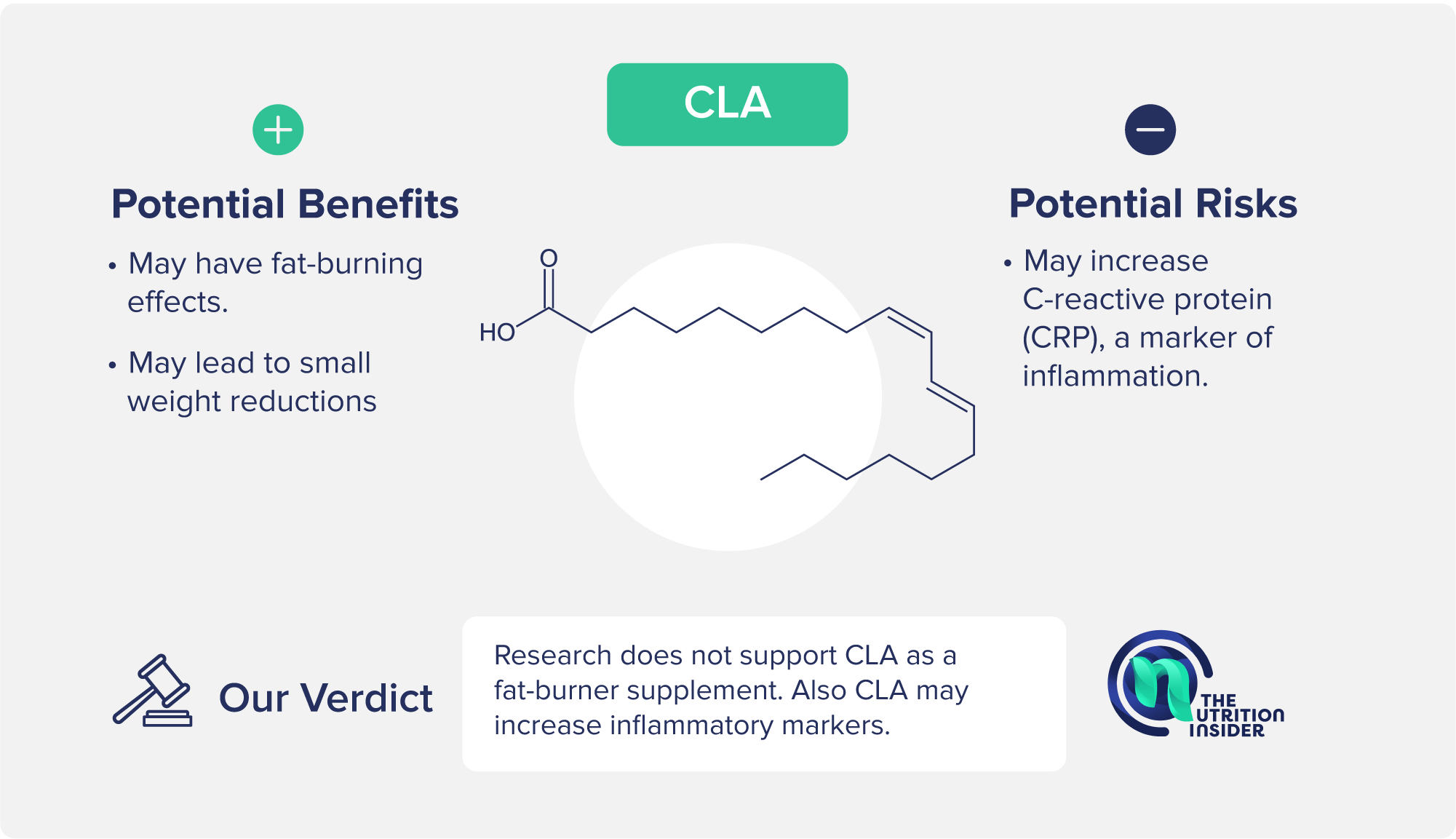
Conjugated linoleic acid (CLA) is a naturally occurring fatty acid found in meat and dairy products.
It’s used in some weight loss supplements because research with animals has found it to have fat-burning effects.
However, research with humans has been inconclusive.
In a review of 18 human studies, supplementing with an average of 3.2g of CLA per day led to small weight reductions of 0.11 pounds per week compared to the placebos.
However, this amount of weight loss is essentially negligible, adding to about one-half of a pound per month.
While most research does not show adverse side effects from CLA, some studies have found that it increases C-reactive protein (CRP), a marker of inflammation.
Overall, the research does not support CLA as a fat-burner supplement, and it may increase inflammatory markers.
Although it’s not what most people want to hear, a healthy, well-balanced diet and regular exercise routine will burn the most belly fat.
As far as supplements go, green tea extract (EGCG), moderate amounts of caffeine, and forskolin provide the greatest fat loss effects with the fewest side effects.
There is no safe and healthy way to lose belly fat quickly—it can take time, effort, and patience.
The best way to reduce belly fat is by reducing caloric intake, increasing protein and fiber intake, moderating alcohol and sugar consumption, and exercising (both aerobic and resistance) several times per week.
Chronic stress can also increase belly fat due to high amounts of cortisol, so managing your stress with exercise, meditation, therapy, deep breathing, drinking less caffeine, or doing yoga may help.
No, lemon water does not burn fat.
However, if you replace high-calorie and high-sugar drinks like soda or sweet tea with lemon water, you may experience weight loss.
Plus, drinking more water and staying hydrated is a helpful way to lose weight.
But lemon water on its own is not a belly fat burner.
Drinking apple cider vinegar before meals has been shown to reduce blood sugar spikes and may suppress appetite slightly, but it doesn’t directly burn belly fat.
One 3-month study of obese adults found that consuming one tablespoon of apple cider vinegar per day led to an average weight loss of 2.6 pounds, while two daily tablespoons promoted an average weight loss of 3.7 pounds.
However, this was over three months (less than one pound per month), so the effects are very modest.
Due to its blood sugar regulation and metabolic effects, drinking apple cider vinegar may help to support modest weight loss over time, but it is definitely not a weight loss miracle cure.
Bracco D, Ferrarra JM, Arnaud MJ, Jéquier E, Schutz Y. Effects of caffeine on energy metabolism, heart rate, and methylxanthine metabolism in lean and obese women. Am J Physiol. 1995;269(4 Pt 1):E671-E678. doi:10.1152/ajpendo.1995.269.4.E671
Callahan MF, Beales M, Oltmans GA. Yohimbine and rauwolscine reduce food intake of genetically obese (obob) and lean mice. Pharmacol Biochem Behav. 1984;20(4):591-599. doi:10.1016/0091-3057(84)90309-5
Chen IJ, Liu CY, Chiu JP, Hsu CH. Therapeutic effect of high-dose green tea extract on weight reduction: A randomized, double-blind, placebo-controlled clinical trial. Clin Nutr. 2016;35(3):592-599. doi:10.1016/j.clnu.2015.05.003
Cohen PA, Wang YH, Maller G, DeSouza R, Khan IA. Pharmaceutical quantities of yohimbine found in dietary supplements in the USA. Drug Test Anal. 2016;8(3-4):357-369. doi:10.1002/dta.1849
Dulloo AG, Duret C, Rohrer D, et al. Efficacy of a green tea extract rich in catechin polyphenols and caffeine in increasing 24-h energy expenditure and fat oxidation in humans. Am J Clin Nutr. 1999;70(6):1040-1045. doi:10.1093/ajcn/70.6.1040
Dulloo AG, Geissler CA, Horton T, Collins A, Miller DS. Normal caffeine consumption: influence on thermogenesis and daily energy expenditure in lean and postobese human volunteers. Am J Clin Nutr. 1989;49(1):44-50. doi:10.1093/ajcn/49.1.44
Godard MP, Johnson BA, Richmond SR. Body composition and hormonal adaptations associated with forskolin consumption in overweight and obese men. Obes Res. 2005;13(8):1335-1343. doi:10.1038/oby.2005.162
Golzarand M, Omidian M, Toolabi K. Effect of Garcinia cambogia supplement on obesity indices: A systematic review and dose-response meta-analysis. Complement Ther Med. 2020;52:102451. doi:10.1016/j.ctim.2020.102451
Haghighatdoost F, Nobakht M Gh BF. Effect of conjugated linoleic acid on blood inflammatory markers: a systematic review and meta-analysis on randomized controlled trials. Eur J Clin Nutr. 2018;72(8):1071-1082. doi:10.1038/s41430-017-0048-z
Heymsfield SB, Allison DB, Vasselli JR, Pietrobelli A, Greenfield D, Nunez C. Garcinia cambogia (hydroxycitric acid) as a potential antiobesity agent: a randomized controlled trial. JAMA. 1998;280(18):1596-1600. doi:10.1001/jama.280.18.1596
Hsu CH, Tsai TH, Kao YH, Hwang KC, Tseng TY, Chou P. Effect of green tea extract on obese women: a randomized, double-blind, placebo-controlled clinical trial. Clin Nutr. 2008;27(3):363-370. doi:10.1016/j.clnu.2008.03.007
Kondo T, Kishi M, Fushimi T, Ugajin S, Kaga T. Vinegar intake reduces body weight, body fat mass, and serum triglyceride levels in obese Japanese subjects. Biosci Biotechnol Biochem. 2009;73(8):1837-1843. doi:10.1271/bbb.90231
Musial C, Kuban-Jankowska A, Gorska-Ponikowska M. Beneficial Properties of Green Tea Catechins. Int J Mol Sci. 2020;21(5):1744. Published 2020 Mar 4. doi:10.3390/ijms21051744
Ostojic SM. Yohimbine: the effects on body composition and exercise performance in soccer players. Res Sports Med. 2006;14(4):289-299. doi:10.1080/15438620600987106
Park KS. Raspberry ketone increases both lipolysis and fatty acid oxidation in 3T3-L1 adipocytes. Planta Med. 2010;76(15):1654-1658. doi:10.1055/s-0030-1249860
Tabrizi R, Saneei P, Lankarani KB, et al. The effects of caffeine intake on weight loss: a systematic review and dos-response meta-analysis of randomized controlled trials. Crit Rev Food Sci Nutr. 2019;59(16):2688-2696. doi:10.1080/10408398.2018.1507996
Whigham LD, Watras AC, Schoeller DA. Efficacy of conjugated linoleic acid for reducing fat mass: a meta-analysis in humans. Am J Clin Nutr. 2007;85(5):1203-1211. doi:10.1093/ajcn/85.5.1203
Yang CS, Zhang J, Zhang L, Huang J, Wang Y. Mechanisms of body weight reduction and metabolic syndrome alleviation by tea. Mol Nutr Food Res. 2016;60(1):160-174. doi:10.1002/mnfr.201500428
Zenk JL, Frestedt JL, Kuskowski MA. HUM5007, a novel combination of thermogenic compounds, and 3-acetyl-7-oxo-dehydroepiandrosterone: each increases the resting metabolic rate of overweight adults. J Nutr Biochem. 2007;18(9):629-634. doi:10.1016/j.jnutbio.2006.11.008